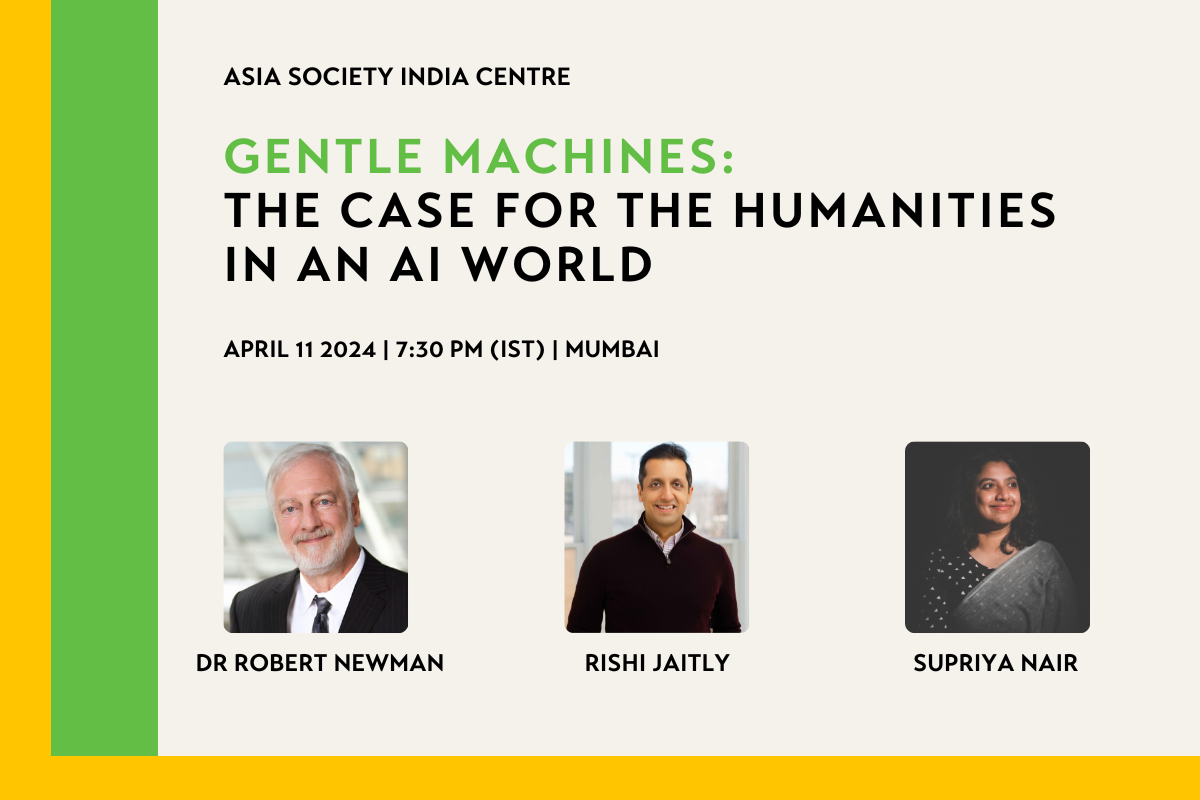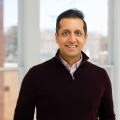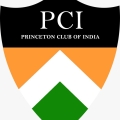Gentle Machines: The Case for the Humanities in an AI World
VIEW EVENT DETAILSThursday, 11th April, 7:30pm onwards

The humanities and social sciences – how we express ourselves, document history, and analyse society – are as important as how buildings are constructed, healthcare is delivered, and living matter is understood. However, for many years, the humanities and social sciences have been treated as less important than science, math, business and technology. Between 2005 and 2020, the US saw a 30% decline in humanities enrolment at the undergraduate level, and the percentages of humanities degrees awarded at the master’s and doctoral level continues to slide.
This is true world over. 2015 saw the Japanese government asking universities to focus on “more practical, vocational education” to “meet societal needs,” and to direct funding accordingly. This was mirrored by the Nepal government, to the point where humanities classrooms would sit empty – no students enrolled in humanities courses. Australia increased tuition fees for humanities and social science (HSS) students, leading to a steady decline in enrolment in the liberal arts. The Australian government wanted students to choose majors that the government called “job relevant” - suggesting that humanities majors do not contribute immediately to the economy or capital markets.
Yet, the humanities have always been critical to civilisational and technological progress. The computer, for instance, relies on Boolean logic, which in turn is a consequence of the mathematical logic first founded by logicians and philosophers. This is true in modern times as well. Inductive and deductive reasoning are shaping AI machines that can reason and learn independent of human intervention. The design of these machines has relied on the work of experts across law and ethics, design, and the history and philosophy of technology. Similarly, the creators of responsible AI tools were an amalgamation of computer and data scientists, social scientists, philosophers and ethicists. The production of machines requires not only technological innovation, but wider and more diverse perspectives on how they will operate in the real world. There are a multitude of legal, moral and ethical issues created by these systems, and it is important to have a strong foundation in the humanities to combat these challenges. Martha Nussbaum argues that the goal of a liberal arts education is to cultivate humanity - to critically self-examine and think about one’s own culture and traditions; to see others and oneself as human, and therefore worthy of concern; and finally, to be able to empathise with others. This will only become more important as technological developments over a few decades are now speeding up – it is said that artificial intelligence will develop faster in one year than in the arc of technological development several decades prior.
So how can we recentre the value of the humanities, both in technology leadership and for their own sake? How can a liberal arts education be encouraged to assist in business and technology leadership? How can education and skill-building be made more holistic?
Join us as we answer these integral questions on the future of AI and the intersections of the humanities with Rishi Jaitly, Professor of Practice and Distinguished Humanities Fellow at Virginia Tech, and Dr. Robert Newman, President of the National Humanities Center, U.S. They will be in conversation with Supriya Nair, journalist, editor, and head, research and media at Godrej DEI Lab.
SPEAKERS

Rishi Jaitly is a distinguished entrepreneur, executive and educator with extensive global experience in technology, media, and civics.
As Professor of Practice and Distinguished Humanities Fellow at Virginia Tech, he founded and leads the Virginia Tech Institute for Leadership in Technology, which offers the world's first Executive Degree in the Liberal Arts and Humanities to rising leaders in the world's technology landscape.
Additionally, Jaitly serves as a Senior Advisor to OpenAI, where he is helping lead the artificial intelligence’s company’s expansion into India and the Global South.
Previously, Jaitly co-founded and served as Founding CEO of Times Bridge, a leading venture capital firm facilitating India launch and leadership for world-leading companies and causes, including Airbnb, Coursera and Uber. Before Times Bridge, he was Twitter Inc's Vice President for Asia Pacific, Middle East, and North Africa, and the Founding Managing Director of Twitter India, leading the company's establishment in and entry into India and beyond. Prior to that, Jaitly held leadership roles at Google & YouTube in South Asia and in Washington, D.C., and served as a speechwriter for Google Chairman and CEO Eric Schmidt.
Jaitly has also devoted a range of his career to social entrepreneurship, co-founding initiatives such as Michigan Corps, Kiva Detroit and the BMe Community, and having served as a Director at both College Summit and the John S. and James L. Knight Foundation. He presently serves as Vice Chairman of the National Humanities Center, and Board Director of Virginia Humanities and the USTA Mid Atlantic Foundation. Jaitly, who is a former Trustee of Princeton University, was in 2022 recognized as one of Rest of World Magazine’s “Top 100 Global Tech Changemakers.”
A public speaker who has been featured in The New York Times, Wall Street Journal and Forbes, and on CNN and the BBC, Jaitly earned his A.B. in History and Certificate in American Studies from Princeton University.

Robert D. Newman is the president and director of the National Humanities Center, the only independent institute for advanced study in the world dedicated exclusively to the humanities. He was previously Dean of the College of Humanities, Professor of English, and Associate Vice President for Interdisciplinary Studies at the University of Utahwhere he was widely recognized for dramatically increasing support for the college, expanding its programs, and broadening campus diversity. In addition to establishing a new Humanities building on campus, he established the first country’s graduate program in Environmental Humanities and led the creation of the Taft/Nicholson Center for Environmental Humanities in Centennial Valley, Montana. He also has held faculty appointments at the University of South Carolina where he was English department Chair, Texas A&M University, and the College of William and Mary.
Dr. Newman was trained as a literary scholar, receiving his Ph.D. from the University of North Carolina at Chapel Hill, and his scholarship has focused on twentieth-century English literature and culture and narrative theory. He has published six books, numerous articles, reviews and poems, and has received awards not only for his scholarship but also for his institutional leadership and teaching. For the past nineteen years, he has been General Editor of the “Cultural Frames, Framing Culture” series published by University of Virginia Press. Recently, he was celebrated as a Distinguished Alumnus as both Penn State and the university of North Carolina.
Since assuming leadership of the National Humanities Center in 2015, Dr. Newman has been dedicated to broadening the Center’s scholarly mission, diversity, programming and educational outreach as well as to encouraging vibrant publicengagement with, and national advocacy for, the humanities.
Supriya Nair is a writer and editor from Mumbai. She is head,
research and media, at the Godrej DEI Lab, and co-founder of the media
start-up All Things Small. Her writing has appeared in The New York
Times, The Atlantic, Foreign Policy, and Wisden.
Experience Partner

Outreach Partner

Event Details
Club Jolie's, Birla Centurion, Worli,
Mumbai 400030
